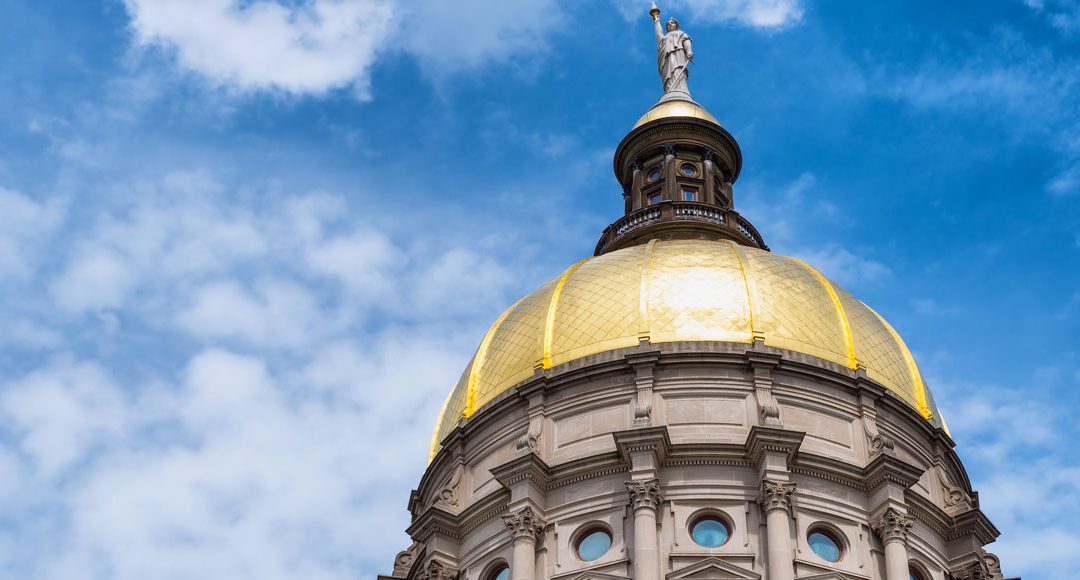
by Georgia Center for Opportunity | Mar 26, 2018
According to scholars, America is increasingly becoming a society polarized between higher- and lower-income people. Whereas until recently a majority of Americans were considered middle class, now good jobs for those who only have a high school diploma are rapidly disappearing—while those with a good education reap the benefits of well-paying jobs and a booming economy.
In short, this increasing economic divergence means it’s harder to achieve the American Dream of upward mobility and a middle class lifestyle. And studies show that not only is the middle class now smaller in size than the top and bottom rungs of the economic ladder combined, the gap between rich and poor is increasing.
Here in Georgia, the statistics are particularly grim. In 2016, 25% of Georgia children were living in poverty—with 60% of all students eligible for free or reduced school lunches. Altogether, 39% of our children grow up in single-parent homes and are six times more likely to be poor. And while graduation rates have increased recently, Georgia still ranks in the bottom five states nationally for drop-out rates.
The bottom line is that 21% of Georgians age 18 to 24 are not successfully transitioning to adulthood. This means they are not enrolled in school, not working, and have no degree beyond a high school diploma. Ultimately, it also means that the devastating cycle of generational poverty will be repeated—leaving little hope of moving into the middle class.
So, how do we help our students turn their lives around? We must give them tools to succeed—specifically by expanding school choice options that put them on what scholars call the “success sequence.” A simple concept, this sequence teaches that a good education leads to a stable job—which in turn leads to a flourishing home life and overall success in life.
Clearly, the all-important first step is getting a good education. And here the data show that expanding school choice is particularly good for poorer students because more competition in education means better schools and improved student outcomes.
The good news is Georgia is a leader in educational opportunity—with more than 17,000 students benefitting from expanded school choice programs. And these programs are popular—with 84 percent of Republicans, 67 percent of independents, and 55 percent of Democrats supporting school choice. Among Millennials and minorities, support is even stronger—and growing—with 74 percent of Latinos, 72 percent of African Americans, and 75 percent of Millennials in favor.
The fact is that most students will continue to be educated in traditional public schools. But we must continue to advocate for expanded school choice and recognize the obvious fact each child is different and many underserved students will be more successful in schools that best meet their needs. Expanded school choice allows parents to send their kids to a school they believe best fits their child—placing them on a success sequence that breaks the cycle of poverty and creates the opportunity for upward mobility and a satisfied life.
Isn’t this what we want for all American kids—and not just the wealthy?

by Georgia Center for Opportunity | Mar 7, 2018
With more than 17,000 students enrolled in scholarship programs, Georgia is a leader in educational opportunity, according to the 2016-2017 School Choice Yearbook put out by the American Federation for Children (AFC). In fact, the Peach State is seventh in the country in scholarship program participation, with 4,000 kids receiving tuition assistance through the Special Needs Scholarship Program and 13,600 more participating in the tax credit scholarship program.
It’s exciting to see enthusiasm like this, but it shouldn’t be surprising. According to a poll by AFC, school choice is popular: 84 percent of Republicans, 55 percent of Democrats, and 67 percent of independents support school choice. Among millennials and minorities, support is even stronger, with 74 percent of Latinos, 72 percent of African Americans, and 75 percent of millennials in favor. And the momentum is only growing.
Why is that the case? Among many other reasons, school choice recognizes the obvious fact that not every student is the same. No school can successfully meet the unique and individual needs of every single student—and no school should. It’s too great a task to ask schools to cater to the kids whose parents want them to learn Mandarin, the kids with particularly complex special needs, the kids who are particularly gifted, the kids who want to play violin, and the kids who would thrive in a traditional school. When some parents want the kids in uniforms, some don’t, and some don’t care but don’t want to fight about it, how can one school please everyone?
School choice means they don’t have to. School choice allows parents to send their kids to whatever school they believe is the best fit for their child’s unique needs, skills, and goals. And who is more invested in a child’s success than their parents?
This year, lawmakers are on track to expand the state’s wildly popular tuition tax credit scholarship program. If the measure passes the Senate, it will allow even more Georgians to access even more opportunity. And opportunity in education means opportunity for life.

by Georgia Center for Opportunity | Feb 22, 2018
Do public charter schools deliver results in a more cost-effective way compared to traditional public schools? That’s the question addressed by a recent research report from the University of Arkansas (PDF download). The answer, it turns out, is unequivocally yes.
Researchers examined eight cities, including Atlanta, for the 2013-2014 academic year. Looking at students in both traditional and charter schools, the research team compared funding levels with performance outcomes on the National Assessment of Educational Progress (NAEP) exam. It turns out that—across all eight cities—students in charter schools performed better on these assessments even though the charter schools received less money.
Charter schools are public schools that have the flexibility to practice innovative approaches to improve academic achievement. Currently, there are 115 charter schools in Georgia and 32 charter systems that include 326 schools.
Specifically focusing on Atlanta charter schools, the University of Arkansas report found the following:
- “After considering the per-pupil funding differences across the two sectors, Atlanta public charter schools produced an average of 2.16 more points on the NAEP reading assessment and 2.26 more points on the NAEP math exam for each $1,000 in funding than Atlanta [traditional public schools].”
- “In Atlanta traditional public schools, average NAEP scores were 257 for reading and 272 for math, and per-pupil revenue was $16,429. In Atlanta public charter schools, average NAEP scores were 258 points for reading and 273 for math, and per-pupil revenue was $14,490.”
The report concludes that “public charter schools result in a bigger bang for fewer bucks than traditional public schools … Since educational resources are limited, charter schools look to be an especially attractive vehicle for delivering education to students more productively.”
A proposal (House Bill 787) currently pending in the Georgia General Assembly would authorize more funding for charter schools, bringing them into parity with funding for traditional public schools.

by Georgia Center for Opportunity | Feb 13, 2018
On Monday, lawmakers in the Georgia House Ways and Means Committee overwhelmingly passed House Bill 482, a measure that would make Education Savings Accounts (ESAs) a reality in the Peach State. Representatives Paul Battles (R- Cartersville), Allen Peake (R- Macon), Chuck Martin (R- Alpharetta), Trey Kelley (R- Cedartown), Dale Rutledge (R- McDonough), David Knight (R- Griffin), Sam Teasley (R- Marietta), Jay Powell (R-Camilla), Shaw Blackmon (R- Bonaire), and Brett Harrell (R- Snellville) all deserve thanks for their role in the bill’s approval.
As HB 482 advances through the legislature, it seems possible that Georgia could become the seventh state to pass ESAs
The idea is simple. Georgia taxpayers currently pay more than $10,000 per student per year for public school education. Parents who withdraw their child from public schools and opt for an ESA would be given a percentage of that money to spend on their child’s education. That money can cover private school tuition, private tutoring, educational therapy, textbooks, online classes, or other educational expenses. Money that’s left over upon high school graduation can be used for college expenses. This empowers parents – who know and love their kids more than any bureaucrat or government official – to take a more active role in their child’s education.
Thanks to an ESA program in Florida, Faith Kleffel, a student with Down Syndrome, was able to access the physical and occupational therapy she needed to thrive. Arizona’s program allows students with autism to attend a school specifically designed with their needs in mind. ESA programs in other states have allowed students to succeed when traditional schools weren’t able to supply what they needed.
Education Savings Accounts give parents more freedom to find the best education for their kids. Launching an ESA program in Georgia will be a win for Georgia kids and Georgia families.

by Georgia Center for Opportunity | Feb 6, 2018
Georgia lawmakers are poised to consider several bills that would make education savings accounts (ESAs) a reality for students in our state. ESAs empower families with the option of leaving their local public school and choosing an educational option that better fits the needs of their child—such as private school, tutoring, or online learning programs.
In a recent piece in the Atlanta Journal-Constitution, columnist Kyle Wingfield makes the strong point that at least one of these bills—House Bill 482—is “probably the most bulletproof piece of school-choice legislation Georgia has ever seen.”
Specifically, the current version of HB 482 has several provisions and accountability measures that directly address common objections raised by opponents of school choice. The bill:
- Reaches students who need help the most: It prioritizes students who have special needs, have been bullied, are from low-income households, are adopted or in the foster-care system, or live with an active-duty military parent stationed in Georgia. This hyper-targeted segment accounts for less than 0.25 percent of the entire public-school student population.
- Implements financial controls and requires standardized testing: The bill also creates strong financial accountability mechanisms for both public and private schools involved with ESAs. Another accountable measure requires students participating in the ESA program to take nationally norm-referenced tests measuring academic achievement in math and language arts.
As Wingfield summarizes, the bill “addresses every objection school-choice opponents have ever raised. Well, except for their objection to the very existence of school choice at all.”
Think about the opportunities opened up by ESAs for students who face a dim future in a school that doesn’t meet their needs:
- A low-income student in a low-performing school district can receive an education that gives him or her the best chance of flourishing in the future.
- A bullied student can escape a toxic, dangerous environment and flourish at a safer school of choice.
- A special-needs student—maybe a child with autism, a traumatic brain injury, or an orthopedic impairment—can receive the individualized attention needed to thrive.
Without ESAs and other school-choice measures, these students are likely to remain stuck in local school districts that fall short in adequately addressing their unique needs.
If lawmakers approved an ESA bill this year, Georgia would become the sixth state nationally to create one of these programs.

by Georgia Center for Opportunity | Jan 19, 2018
With much ceremony, the Georgia General Assembly kicked off the 2018 legislative session last week. Thanks to election-year buzz, candidates have fueled talk of big education reforms that could see needed movement. Because this session is expected to fly by, we have our eye on a couple of key school choice bills that could shuffle through the process quickly.
Here are two important pieces of legislation that we hope will (finally) get the traction they deserve in the State House and Senate.
Tax Credit Scholarship Expansion
No child should be denied the opportunity to seek out the education they need because of an arbitrary government roadblock, but that’s exactly what’s happening to thousands of Georgia students.
The state currently offers limited access to a popular tax credit scholarship, allowing only a small number of families an opportunity to seek out the right education for their children. However, a low cap on donated funds has meant that generous contributors- and students the program is supposed to serve- have been turned away by the state because of over-demand.
Lawmakers are said to be considering raising the program’s $58 million ceiling, which would lift barriers for many more Georgia children. Because the kids waiting in line for scholarships can’t afford another year in the wrong classroom, we’re urging the legislature to waste no time in passing an expansion of the tax credit scholarship bill.
Education Savings Accounts
Education Savings Accounts (ESAs) aim to provide needed flexibility and customized education options for Georgia parents. Similar to Flexible Spending Accounts (FSAs) or Health Savings Accounts (HSAs), under an ESA, the state would put money into a restricted account for education expenses that parents would control.
While there are several versions of the legislation that seek to fit the needs of different families-such as those in the military or those with children who have disabilities- the passage of nearly any of these bills would make a big impact in the lives of many Georgia parents.
The Georgia Center for Opportunity is committed to removing barriers for our state’s kids so that they receive the education they need. While the legislature will have their hands full, we hope they agree that bills benefitting children and their families should stand out among their highest priorities. To follow the progress of these bills with us, check back on our blog or subscribe to the GCO’s newsletter.





